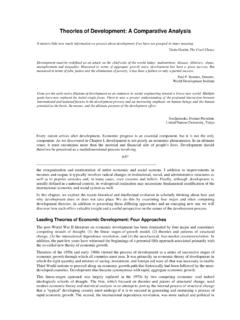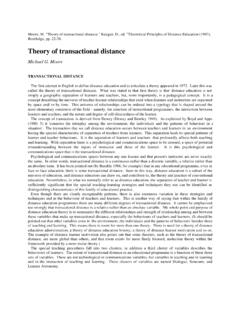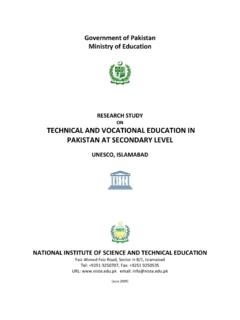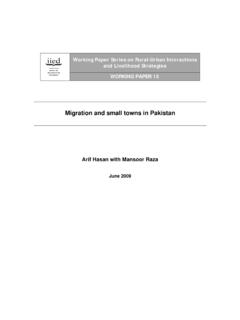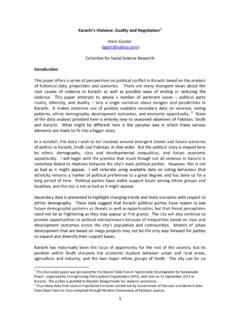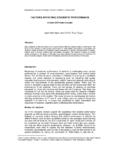Transcription of DEVELOPMENT AS FREEDOM - Uni Oldenburg
1 Sen, A. (1999). DEVELOPMENT as FREEDOM . Oxford: Oxford University Press. IntroductionINTRODUCTIONDEVELOPMENT AS FREEDOMD evelopment can be seen, it is argued here, as a process of expanding the real freedoms that people on human freedoms contrasts with narrower views of DEVELOPMENT , such as identifyingdevelopment with the growth of gross national product, or with the rise in personal incomes, or withindustrialization, or with technological advance or with social modernization. Growth of GNP or ofindividual incomes can, of course, be very important as means to expanding the freedoms enjoyed by themembers of the society. But freedoms depend also on other determinants, such as social and economicarrangements (for example, facilities for education and health care) as well as political and civil rights (forexample, the liberty to participate in public discussion and scrutiny).
2 Similarly, industrialization ortechnological progress or social modernization can substantially contribute to expanding human FREEDOM ,but FREEDOM depends on other influences as well. If FREEDOM is what DEVELOPMENT advances, then there is amajor argument for concentrating on that overarching objective, rather than on some particular means, orsome specially chosen list of instruments. Viewing DEVELOPMENT in terms of expanding substantivefreedoms directs attention to the ends that make DEVELOPMENT important, rather than merely to some of themeans that, inter alia, play a prominent part in the requires the removal of major sources of unfreedom: poverty as well as tyranny, pooreconomic opportunities as well as systematic social deprivation, neglect of public facilities as well asintolerance or overactivity of repressive states.
3 Despite unprecedented increases in overall opulence, thecontemporary world denies elementary freedoms to vast numbers - perhaps even the majority - of the lack of substantive freedoms relates directly to economic poverty, which robs people of thefreedom to satisfy hunger or to achieve sufficient nutrition, or to obtain remedies for treatable illnesses, orthe opportunity to be adequately clothed, or sheltered, or to enjoy clean water or sanitary facilities. Inother cases, the unfreedom links closely to the lack of public facilities and social care, such as the absenceof epidemiological programs, or of organized arrangements for health care or educational facilities, or ofeffective institutions for the maintenance of local peace and order.
4 In still other cases, the violation offreedom results directly from a denial of political and civil liberties by authoritarian regimes and fromimposed restrictions on the FREEDOM to participate in the social, political and economic life of AND INTERCONNECTIONSF reedom is central to the process of DEVELOPMENT for two distinct ) The evaluative reason: assessment of progress has to be done primarily in terms of whether thefreedoms that people have are enhanced;2-) The effectiveness reason: achievement of DEVELOPMENT is thoroughly dependent on the free agencyof have already signaled the first motivation the evaluative reason for concentrating on Inpursuing the second, that of effectiveness, we have to look at the relevant empirical connections, inparticular at the mutually reinforcing connections between freedoms of different kinds.
5 It is because ofthese interconnections, which are explored in some detail in this book, that free and sustainable agencyemerges as a major engine of DEVELOPMENT . Not only is free agency itself a "constitutive" part ofdevelopment, it also contributes to the strengthening of free agencies of other kinds. The empiricalconnections that are extensively explored in this study link the two aspects of the idea of " DEVELOPMENT asfreedom."The relation between individual FREEDOM and the achievement of social DEVELOPMENT goes well beyond theconstitutive connection - important as it is. What people can positively achieve is influenced by economicopportunities, political liberties, social powers, and the enabling conditions of good health, basiceducation, and the encouragement and cultivation of initiatives.
6 The institutional arrangements for theseopportunities are also influenced by the exercise of people's freedoms, through the liberty to participate insocial choice and in the making of public decisions that impel the progress of these opportunities. Theseinterconnections are also investigated ILLUSTRATIONS: POLITICAL FREEDOM AND QUALITY OF LIFEThe difference that is made by seeing FREEDOM as the principal ends of DEVELOPMENT can be illustrated witha few simple examples. Even though the full reach of this perspective can only emerge from a much moreextensive analysis (attempted in the chapters to follow), the radical nature of the idea of " DEVELOPMENT asfreedom" can easily be illustrated with some elementary , in the context of the narrower views of DEVELOPMENT in terms of GNP growth or industrialization, itis often asked whether certain political or social freedoms, such as the liberty of political participation anddissent, or opportunities to receive basic education, are or are not "conducive to DEVELOPMENT .
7 " In the lightof the more foundational view of DEVELOPMENT as FREEDOM , this way of posing the question tends to missthe important understanding that these substantive freedoms (that is, the liberty of political participation orthe opportunity to receive basic education or health care) are among the constituent components ofdevelopment. Their relevance for DEVELOPMENT does not have to be freshly established through theirindirect contribution to the growth of GNP or to the promotion of industrialization. As it happens, thesefreedoms and rights are also very effective in contributing to economic progress; this connection willreceive extensive attention in this book.
8 But while the causal relation is indeed significant, the vindicationof freedoms and rights provided by this causal linkage is over and above the directly constitutive role ofthese freedoms in second illustration relates to the dissonance between income per head (even after correction for pricevariations) and the FREEDOM of individuals to live long and live well. For example, the citizens of Gabon orSouth Africa or Namibia or Brazil may be much richer in terms of per capita GNP than the citizens or SriLanka or China or the state of Kerala in India, but the latter have very substantially higher lifeexpectancies than do the take a different type of example, the point is often made that African Americans in the United Statesare relatively poor compared with American whites, though much richer than people in the third world.
9 Itis, however, important to recognize that African Americans have an absolutely lower chance of reachingmature ages than do people of many third world societies, such as China, or Sri Lanka, or parts of India(with different arrangements of health care, education, and community relations). If DEVELOPMENT analysisis relevant even for richer countries (it is argued in this work that this is indeed so), the presence of suchintergroup contrasts within the richer countries can be seen to be an important aspect of the understandingof DEVELOPMENT and , MARKETS AND ECONOMIC UNFREEDOMA third illustration relates to the role of markets as part of the process of DEVELOPMENT .
10 The ability of themarket mechanism to contribute to high economic growth and to overall economic progress has beenwidely - and rightly - acknowledged in the contemporary DEVELOPMENT literature. But it would be amistake to understand the place of the market mechanism only in derivative terms. As Adam Smith noted, FREEDOM of exchange and transaction is itself part and parcel of the basic liberties that people have reasonto be generically against markets would be almost as odd as being generically against conversationsbetween people (even though some conversations are clearly foul and cause problems for others - or evenfor the conversationalists themselves).
